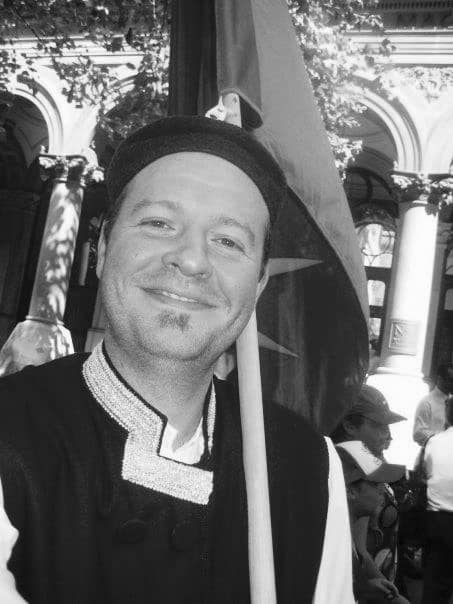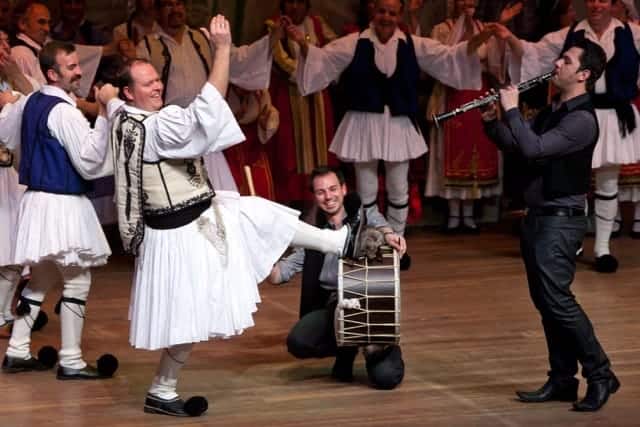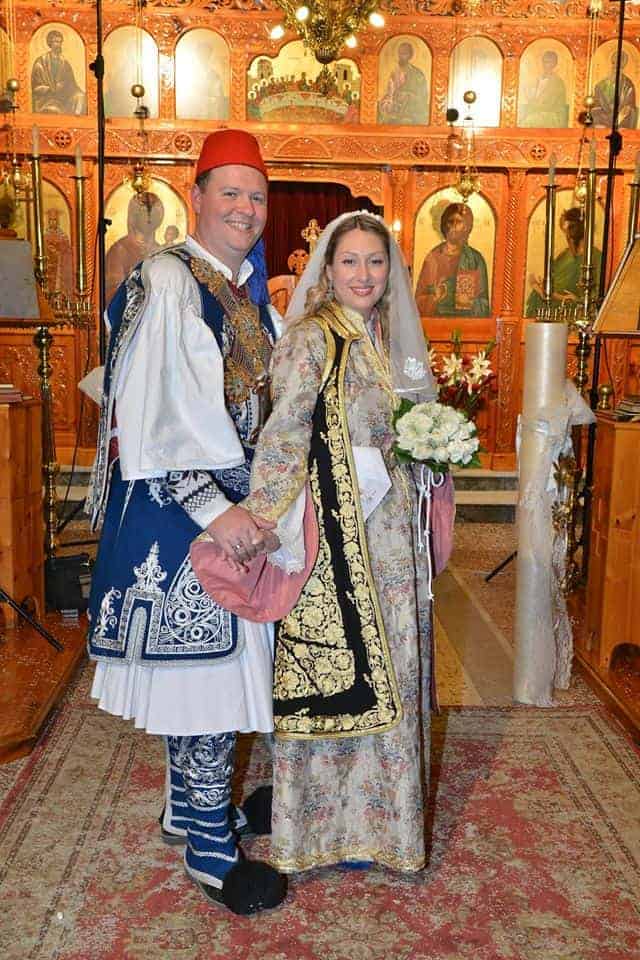
Vasilios Thrasivoulos Aligiannis has a deep passion for Greek history, an unbridled love of his Hellenic heritage, and is a tireless ambassador for Greek folkloric dance. He has been operating his own dance classes for almost 25 years, and recently married the love of his life- both dressed in traditional costumes from their respective villages.
They spent their honeymoon travelling through the villages of Greece collating traditions, customs, researching dance choreography and collecting music and books.
We recently had a chat to Vasilios about his Greek dance teaching, workshops and his amazing collections.
What is your line of work?
My name is Vasilios Thrasivoulos Aligiannis and I am Head Teacher History at a high school in Sydney. Well - that is my day job that pays the bills. I spend my evenings working with organisations within the Greek community and running my own dance school. My commitments see me as President of OPA (Organisation of Pan-Hellenism In Australia), Principal and Artistic Director of the Institute of Hellenic Dance & Culture, Instructor of the Pan-Macedonian Lyceum Hellenic Dancers of NSW and Founder/Instructor of the Greek Folk Dancers of NSW, which has been in operation for nearly 25 years in Sydney. My line of work on a daily basis involves learning about and teaching history, teaching Greek dance and research into our Hellenic cultural heritage.
Where were you born and where do you currently reside?
I was born in Sydney in 1974. However, I personally feel I was born in the wrong era and place. I think I am more suited for the timeframe of 150 years ago, living in a quaint village on a mountain in Greece. I currently live in Sydney, we (my wife, my soon to be born child and I) purchased a new home. Living the dream of a suburban life in a cookie cutter new housing estate. A far call from my quaint village on a mountain side in Greece.
What part of Greece are your ancestors from?
My cultural heritage stems from various parts of Greece. However, both my parents were born in Arkadia in the Peloponnese. My paternal grandfather was originally from a village in North Western Epirus called Vavouri, however, he had ties in Northern Epirus. My maternal grandfather was again from the north stemming from Grevena, in Makedonia. Both grandfathers ended up marrying in the south and that is where my parents were born.
I recently married, so my family is now extended. I have fallen in love with my wife’s side of the family and now I’m an honorary Konitsioti (from Konitsa in Epirus) and also Cappadocian heritage from Rita’s grandparents, who were displaced during the 1930’s due to the exchange of populations. So, I feel that connection through my wife and her family. My wife was born in Konitsa, hence the strong connection and ties with the family back home.
Have you been to Greece?
I have and to be honest I think I’ve lost count as to how many times. My last trip was possibly my 15th trip to Greece. I have travelled elsewhere in the world however, Greece draws me back every time and each time I go back, I explore a new region on the mainland or islands. To date, I still haven’t travelled past Serres in Makedonia, so Thrace would be on the cards next, including Istanbul, together with the islands on the North West Aegean.

Tell us about your journey of Greek dance, did you Greek dance as a child? What ignited your interest? What led to starting your own group?
Where do I start?! The journey started with an old record player my aunty had, some Greek records from the late 1960s/early 1970s and house parties! We would loan the old record player from my aunty and my dad would organise a party (with lamb on the spit of course). It would have been for birthdays or giortes mainly – but I don’t remember why the parties were happening. I do remember the music and dance! I loved it. I would be on the end of the circle and I remember to this day the feeling I got when I danced. My favourite album was an island compilation with singers Anna Karampesini and Efi Sarri. It was all scratchy as a LP was and I loved that we could dance every song on the album which meant we could dance for 20 minutes straight.
I did dance when I was young, I think my first lesson was when I started school. My first teacher in dance was Paroula Therban, who celebrates over 50 years in Greek dance in the community. Since then I danced for several other teachers and have gone overseas to more than 15 workshops in Greece, learning from the best in their field of research. I have participated in workshops run by the Dora Stratou Dance Theatre and Lyekeio Ellinidon – Athens.
I started to teach at the age of 12. My teacher at the time, Sofia Rossidies, was teaching younger children at St Euphemia College and that is where I helped and taught. Soon after, she left the class to me and I started teaching at the college. It was about 1991-1992 when that happened. However, I had started teaching my own group two years earlier on Tuesday nights at the church hall. I was also dancing for the Pan-Macedonian Lyceum from the age of about 14 years. I continued to dance for many years as lead dancer and eventually took over and currently am still teaching the Pan-Macedonian Lyceum.
In 1992 I founded my own personal dance group, the Greek Folk Dancers of NSW ‘Ο ΘΡΑΣΥΒΟΥΛΟΣ’ dedicated to the memory of my maternal grandfather, who was a lover of dance and played several instruments. The dance gene must’ve come from him! Next year in 2017 I celebrate 25 years of teaching Greek dance.
Tell us about your collections?
I have been collecting costumes for over 25 years. I have collected several small authentic pieces dating from 1875 – the earliest. These pieces are used in displays and cultural exhibitions. I have accumulated over 500 costumes used by the dance group. Some made here in Australia with imported materials by my mother, other costumes have been brought from Greece. My most recent acquisition is a set of women’s costumes from Misti Cappadocia made in Thessaloniki. My costumes are very well known in the community and people know my group when we perform.
I have collected over 190,000 traditional songs and dances in mp3 format. I have over 2,000 CDs and over 200 books based on Greek culture, song, dance and research into each of these. My favourite book is from Lefteris Drandakis (personally signed) called 'Roumlouki – Dimotiki xoroi kai tragoudia tou Romiotopo.' This also includes 5 CDs with original recordings from the Hellenic Lyceum in Athens. Lefteris donated the copy to my archive. I met Lefteris in 2009 whilst I was researching the dances of Epirus with Kostas Mitsis and I got to see Lefteris in his element. He was researching the songs and dances from Syrakko village in Epirus. I spent many hours talking to this amazing man who shared so much of his amazing knowledge.
Being a history teacher my next love is collecting books on history - Greek and non-Greek of course. However, my Greek cultural books are my pride and joy! I hope to eventually start a cultural centre to put into a library and also organise exhibitions based on Greek culture.

Tell us about your wedding?
I met the love of my life later in life. I never clicked with many women as they didn’t want a husband who was a Greek dancer. However, Rita not only embraced my work but also adapted to teaching herself and now she teaches the women’s dances and I do the men’s. We decided to get married in Greece- in Australia weddings have become a bit of an overdose of ‘over the top’, and we opted for a more traditional wedding in Rita’s birthplace of Konitsa in Epirus. We both wore our costumes that reflected our villages and we combined both families for the most amazing experience ever. We then embarked on our 3 month honeymoon in Greece touring and researching as we went. We had so much fun!
How did Vimata come about?
Vimata was a concept that I played around with for a year or so. I wanted to bring teachers out from Greece to Sydney Australia. I wanted to educate dance schools within Sydney to help build their repertoire of Greek dances. Not everyone knows where to go to learn, some people don’t even know how to speak Greek. However, this allows them the access to quality teachers, resources and of course loads of dancing!
What inspires you?
I am inspired by how amazing our Hellenic culture is and at any given moment I share what I have learnt about it to anyone. I teach History in a High School but always in every lesson there will be a link to something Greek – be it historical, linguistic or cultural.
How has your upbringing influenced the work you do today?
My parents would make sure I always read my Greek books, you know the ones that had the owl logo on it and we use to say 'O daskalos einai blakas!' They were my Golden Books growing up, especially the history ones! Being a History teacher and leading teacher of a faculty, I manage several staff and ensure they are teaching as per the syllabus. However, I do love to put in the odd references to Greek History. I taught my current Modern History class about the Pontian Genocide.
What is one piece of ancestral knowledge that you remember to this day?
I remember reading my grandfather's diary and one event that stands out was in WWII, he endured the beheading of his brother and watched the Germans play soccer with his head. He then wrote life goes on…don’t forget those who have gone before us. ‘Η ζωη συνεχιζεται, αλλα μην ξεχνατε αυτοι που εφυγανε.' Pay respect to our forefathers who fought so hard, so as we can be free.
Aside from your family, which Greeks have influenced you?
Dora Stratou – an amazing woman who put Greek Dance on the world stage.
Kallirroi Siganou-Parren – another amazing woman who founded the Hellenic Lyceum in Athens
Lefteris Drandakis – Researcher and Artistic director the Lyceum in Athens
Simon Karras – Researcher, Ethnomusicologist and founder of the Simon Karras Foundation for the dissemination of the ethnic music of Greece
Domna Samiou – Folk singer, Researcher into Greek Song
Aggeliki Hatzimihalis – Researcher, Ethnomusicologist, She dedicated her life to collecting and preserving the folk art and traditions in Greece. She was all inspiring and amazing.
What is your favourite Greek food?
Hmmm pita gyro from Thanasis in Athens.
Stay updated with the latest news from Greece and around the world on greekcitytimes.com.
Contact our newsroom to share your updates, stories, photos, or videos. Follow GCT on Google News and Apple News.

